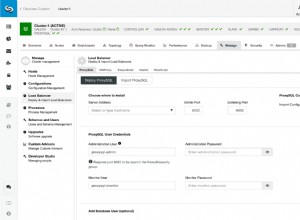Anch'io ho avuto questo problema, ma l'ho risolto. Farò una rapida guida su come caricare un file in una directory e salvare il percorso in MySQL, puoi eseguire più query dopo aver visto la query iniziale, in questo modo puoi eliminare ed eliminare il file come desideri . Ecco qui:
<form action="upload.php" method="post" enctype="multipart/form-data">
Select image to upload:<br>
<input type="file" name="fileToUpload" id="fileToUpload"><br><br>
<input type="submit" value="Upload Image" name="submit">
</form>
<?php $target_dir = "ANY_DIRECTORY_YOU_LIKE/PICTURES/";
$target_file = $target_dir . basename($_FILES["fileToUpload"]["name"]);
$uploadOk = 1;
$imageFileType = pathinfo($target_file,PATHINFO_EXTENSION);
// Check if image file is a actual image or fake image
if(isset($_POST["submit"])) {
$check = getimagesize($_FILES["fileToUpload"]["tmp_name"]);
if($check !== false) {
echo "File is an image - " . $check["mime"] . ".";
$uploadOk = 1;
} else {
echo "File is not an image.";
$uploadOk = 0;
}
}
// Check if file already exists
if (file_exists($target_file)) {
echo "Sorry, file already exists.";
$uploadOk = 0;
}
// Check file size
if ($_FILES["fileToUpload"]["size"] > 1000000) {
echo "Sorry, your file is too large.";
$uploadOk = 0;
}
// Allow certain file formats
if($imageFileType != "jpg" && $imageFileType != "png" && $imageFileType != "jpeg"
&& $imageFileType != "gif" ) {
echo "Sorry, only JPG, JPEG, PNG & GIF files are allowed.";
$uploadOk = 0;
}
// Check if $uploadOk is set to 0 by an error
if ($uploadOk == 0) {
echo "Sorry, your file was not uploaded.";
// if everything is ok, try to upload file
} else {
if (move_uploaded_file($_FILES["fileToUpload"]["tmp_name"], $target_file)) {
echo "The file ". basename( $_FILES["fileToUpload"]["name"]). " has been uploaded.";
$pictureName = "ANY_DIRECTORY_YOU_LIKE/PICTURES/". basename( $_FILES["fileToUpload"]["name"]);
$servername = "localhost";
$username = "MySQL_USERNAME";
$password = "MySQL_PASSWORD";
$dbname = "MySQL_DATABASE_NAME";
// Create connection
$conn = new mysqli($servername, $username, $password, $dbname);
// Check connection
if ($conn->connect_error) {
die("Connection failed: " . $conn->connect_error);
}
$sql = "UPDATE TableName SET myPicture='$pictureName' WHERE email='$myEmail' AND password='$myPassword'";
// Make Sure to tell MySQL which user you want to update which means setting the variable $myEmail and $myPassword accordingly
if ($conn->query($sql) === TRUE) {
echo "Record updated successfully";
} else {
echo "Error updating record: " . $conn->error;
}
$conn->close();
} else {
echo "Sorry, there was an error uploading your file.";
}
}
?>
Divertiti! Oh, e il mio database sta usando VarChar per le immagini. Se vuoi essere creativo e trovare un altro modo, vai avanti.




